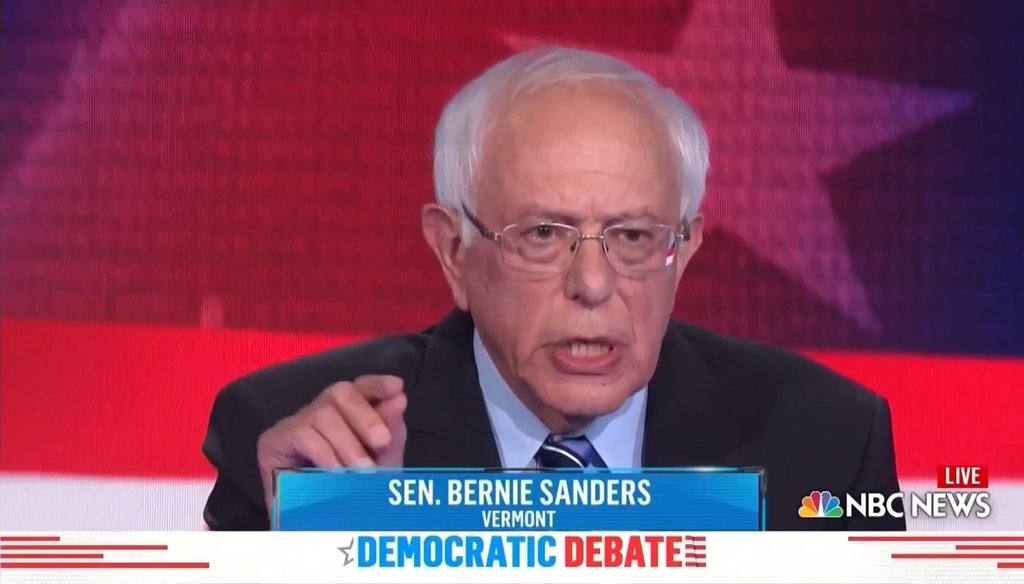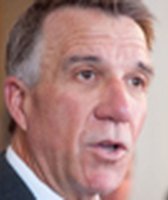Stand up for the facts!
Our only agenda is to publish the truth so you can be an informed participant in democracy.
We need your help.
I would like to contribute

Sen. Bernie Sanders speaks during the second night of the first Democratic debates for the 2020 presidency, which took place on June 28 in Miami, Florida.
Bernie Sanders has a confounding record on gun control. But he was mostly right on debate night.
[O]n a crowded debate stage with nine other candidates vying for the Democratic presidential nomination, Sen. Bernie Sanders, I-Vt., found last Thursday night that his toughest opponent may have been himself – in 2013.
During the debate, MSNBC moderator Rachel Maddow asked the Vermont senator about something he had said to Seven Days — a weekly alternative newspaper in Burlington — six years ago, but that was only just published last week in an analysis of Sanders’ views about gun-control throughout his political career.
"Sen. Sanders, a Vermont newspaper recently released portions of an interview you gave in 2013 in which you said, ‘my own view on guns is, everything being equal, states should make those decisions,’" Maddow said.
"No," Sanders interjected before Maddow continued.
"Has your thinking changed since then?" she asked. "Do you now think there’s a federal role to play?"
"No, that’s a mischaracterization of my thinking," Sanders replied.
"It’s a quote of you," Maddow responded to laughter from the audience.
Did Maddow misrepresent what Sanders thought about gun-control in 2013?
A spokesperson for the Sanders camp said the MSNBC moderator’s question falsely asserts that Sanders does not believe the federal government should regulate firearms.
"The question characterized the 2013 interview as Bernie asserting he believed there to be no federal role to play in gun legislation," the campaign said.
"Both in that exact interview, and for years prior, Bernie has long articulated a strong federal role to play, including the ban of assault weapons and the mandate of background checks and the banning of straw man purchases."
Based on Sanders interjection of "no" and his interruption of Maddow before she was able to finish her question, one could assume Sanders was objecting to his own quote read in isolation.
This is apparently how Maddow also interpreted Sanders, as she retorts, "it’s a quote of you."
But it’s impossible to know what Sanders was thinking, so we’re giving the senator the benefit of the doubt.
What is clear, however, is that Sanders’ history on guns confounding at best — and the Vermont senator has admitted that it has not been one of his core issues.
In the late 1980s and 1990s, he is quoted saying that he believes gun-control measures should be, for the most part, left to state government to decide on — a position he reiterated in his 2013 interview with Seven Days.
"It's a local control issue," Sanders said in 1988. "In Vermont, it is not my view that the present law needs any changing," he added on the issue of a waiting period for handguns.
But it’s also true that in some cases, stretching back to the 1990s, he has supported a federal role, which is where Maddow’s question seems somewhat misinformed.
This dissonance in Sanders’ gun stance is illustrated when he voted against the Brady bill — which required background checks and imposed a five-day waiting period for handgun purchases — in 1993 and then six months later, in May of 1995, he voted in favor of a ban on assault weapons.
During last week’s debate, Sanders responded to Maddow by pointing to his support for banning assault weapons and prohibiting straw purchases as examples of his belief the federal government should make decisions on firearm regulation.
Politifact compiled his federal voting record on gun issues up to 2013 and in most cases he has voted for more gun control.
Since 2013 his gun control credentials have been even stronger. He voted in favor of limiting magazine ammunition capacity, background checks for online sales, and was a co-sponsor of legislation that would make states work with the U.S. Attorney General to implement a plan for a firearm purchases registry.
To determine whether the quote used by Maddow took on a different meaning within the full interview from 2013, we listened to audio Seven Days posted as part of its recent story on Sanders’ views on gun-control.
In the recording, Paul Heintz, the reporter who sat down with Sanders months after the shooting at Sandy Hook Elementary School in Connecticut, asked Sanders if he had noticed a change in how Vermonters feel about firearms and gun rights.
Sanders responded that he was not an expert on gun-control policy, but that he would "suspect there has been a gradual shift, probably to more support for gun-control."
Sanders then began to speak about the lack of will in the Vermont Legislature to take up gun-control measures and how there is "virtually no gun-control at all" in Vermont.
In 2018 Gov. Phil Scott signed sweeping firearm regulations that mandate background checks prior to all firearm sales, raise the minimum age to buy a gun from 16 to 21, and ban bump stocks and high-capacity ammunition magazines.
In the interview six years ago, Sanders said there has "not been much effort" to pass gun-control measures in Vermont because it is a "rural state" with "tens of thousands of families who hunt" and, he added, "thank God our crime rate is much lower than many other states."
Then Sanders pivoted away from Vermont policy to national politics.
Sanders explained that he voted for a ban on assault weapons in 1994 because he thought "nationally it made sense." Sanders won election to Congress in 1990 in part when his opponent, incumbent Republican Peter Smith, changed his mind and said he supported an assault weapons ban, drawing the ire of the National Rifle Association.
In the interview, Sanders went on to say he opposed and voted against the Brady bill because the Vermont Legislature had "no inclination" to approve similar handgun registration and waiting period laws at the state level.
"I voted against the Brady bill, I thought that was a decision for the states to make. So my own view on guns is, everything being equal, the states should make those decisions," he said in 2013.
However, directly after saying the quote Maddow used during the debate, Sanders goes on to say that Congress is looking at mandating increased background checks and banning straw purchases — both federal firearm policies he said "made sense."
"On the other hand, there are some federal issues that go beyond what states do," the Vermont senator added about the federal role in regulating firearms.
We reached out to Heintz to get his take on whether Maddow was mischaracterizing the 2013 interview with Sanders.
"I think our 2013 interview with Sen. Sanders stands on its own and I think last night’s debate stands on its own," Heintz said. "Both are available online and I encourage people to watch and listen and draw their own conclusions."
Our Sources
Bernie Sanders, Democratic primary presidential debate remarks, June 27, 2019.
Rachel Maddow, Democratic primary presidential debate question, June 27, 2019.
Email with Arianna Jones, Sanders 2020 presidential campaign, June 25, 2019.
Phone interview with Paul Heintz, reporter at Seven Days, June 28, 2019.
Seven Days. "Stickin’ to His Guns? The NRA Helped Elect Bernie Sanders to Congress. Now He’s Telling a Different Story." June 26, 2019
Politifact. "Did Bernie Sanders vote against background checks and waiting periods for gun purchases?" July 10th, 2015.
Seven Days. "Sanders Disputes Seven Days Story During Democratic Debate." June 27, 2019.
Browse the Truth-O-Meter
More by Kit Norton
Bernie Sanders has a confounding record on gun control. But he was mostly right on debate night.
Support independent fact-checking.
Become a member!
In a world of wild talk and fake news, help us stand up for the facts.
































